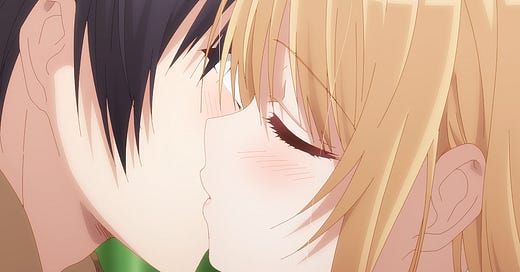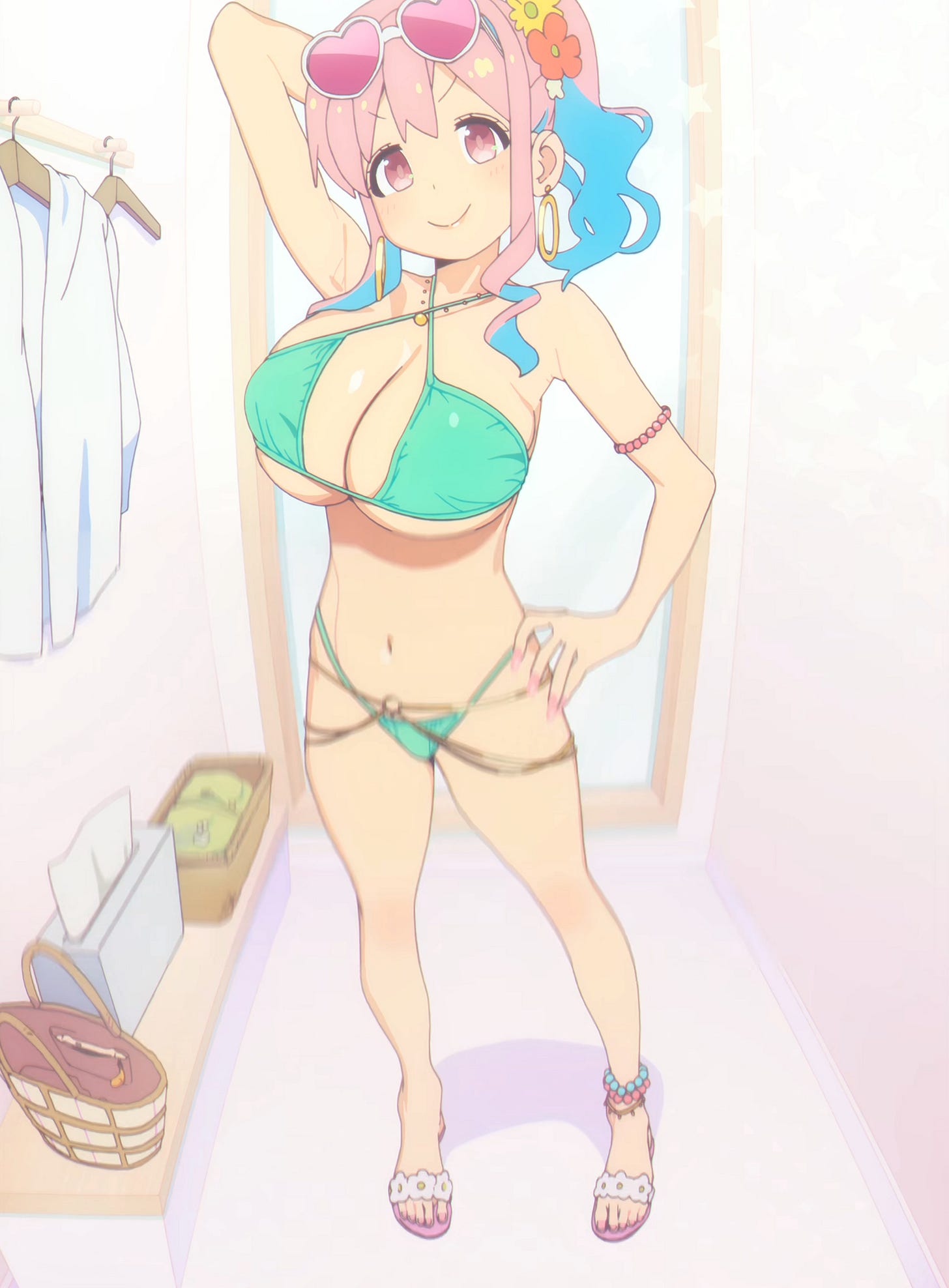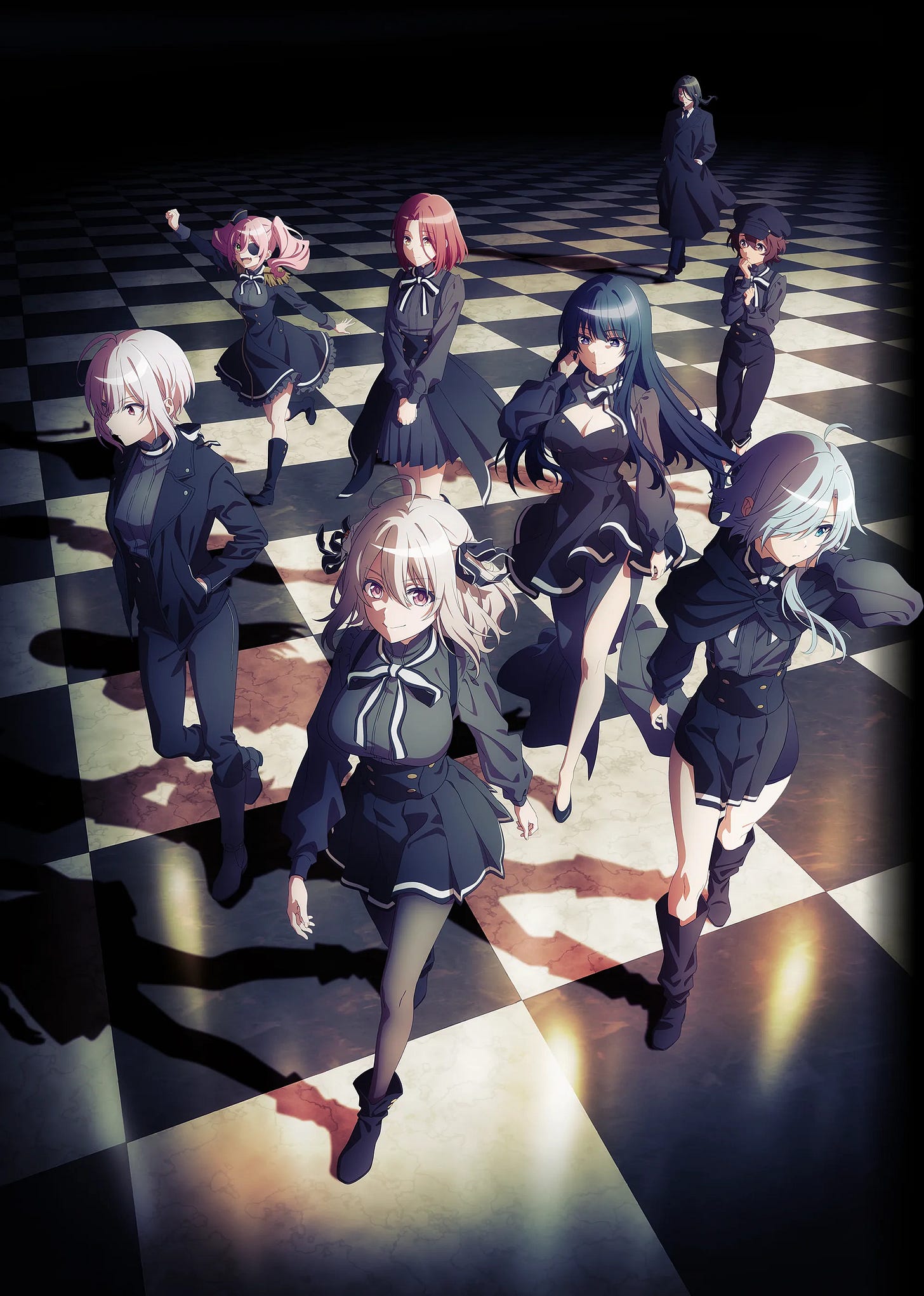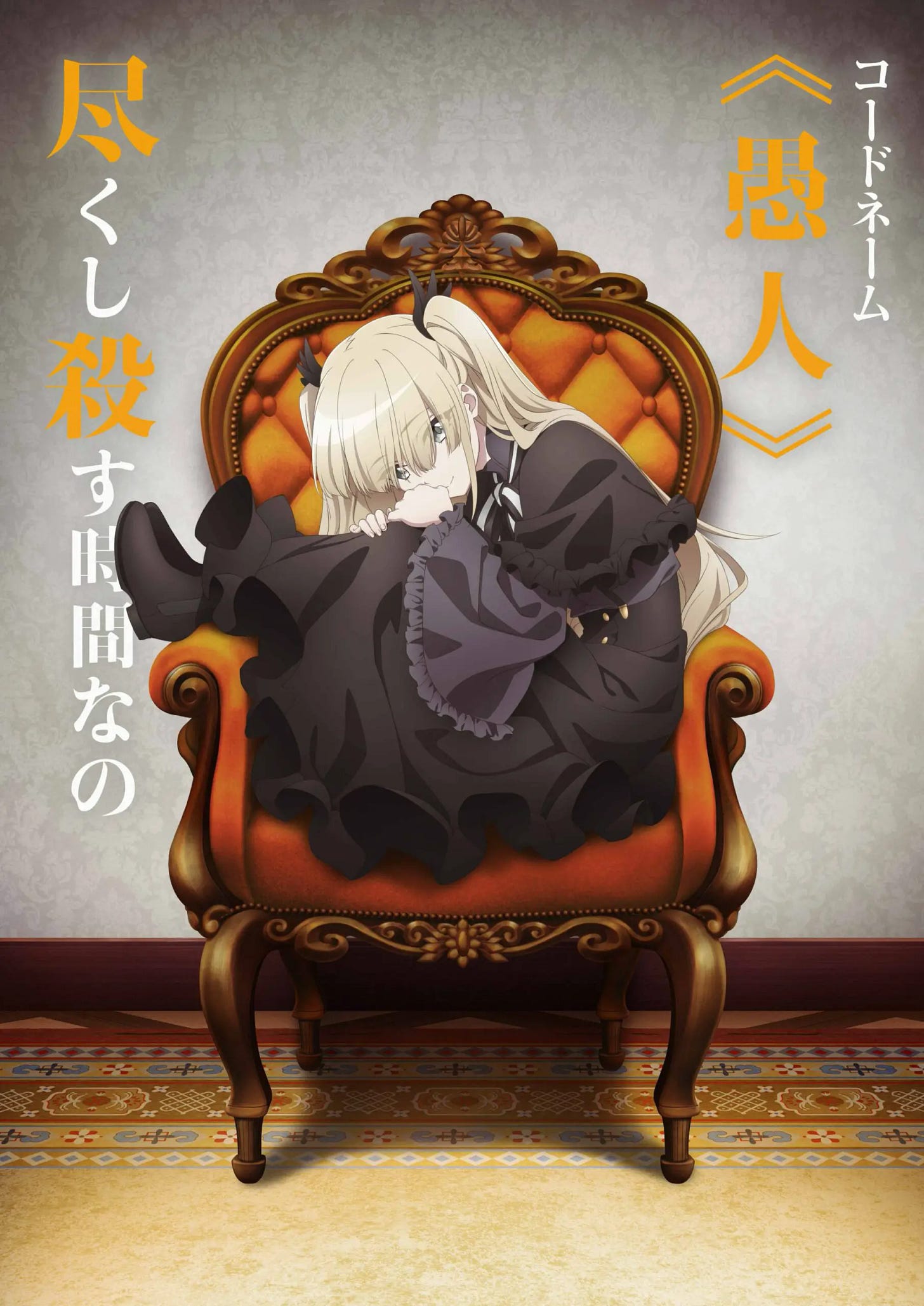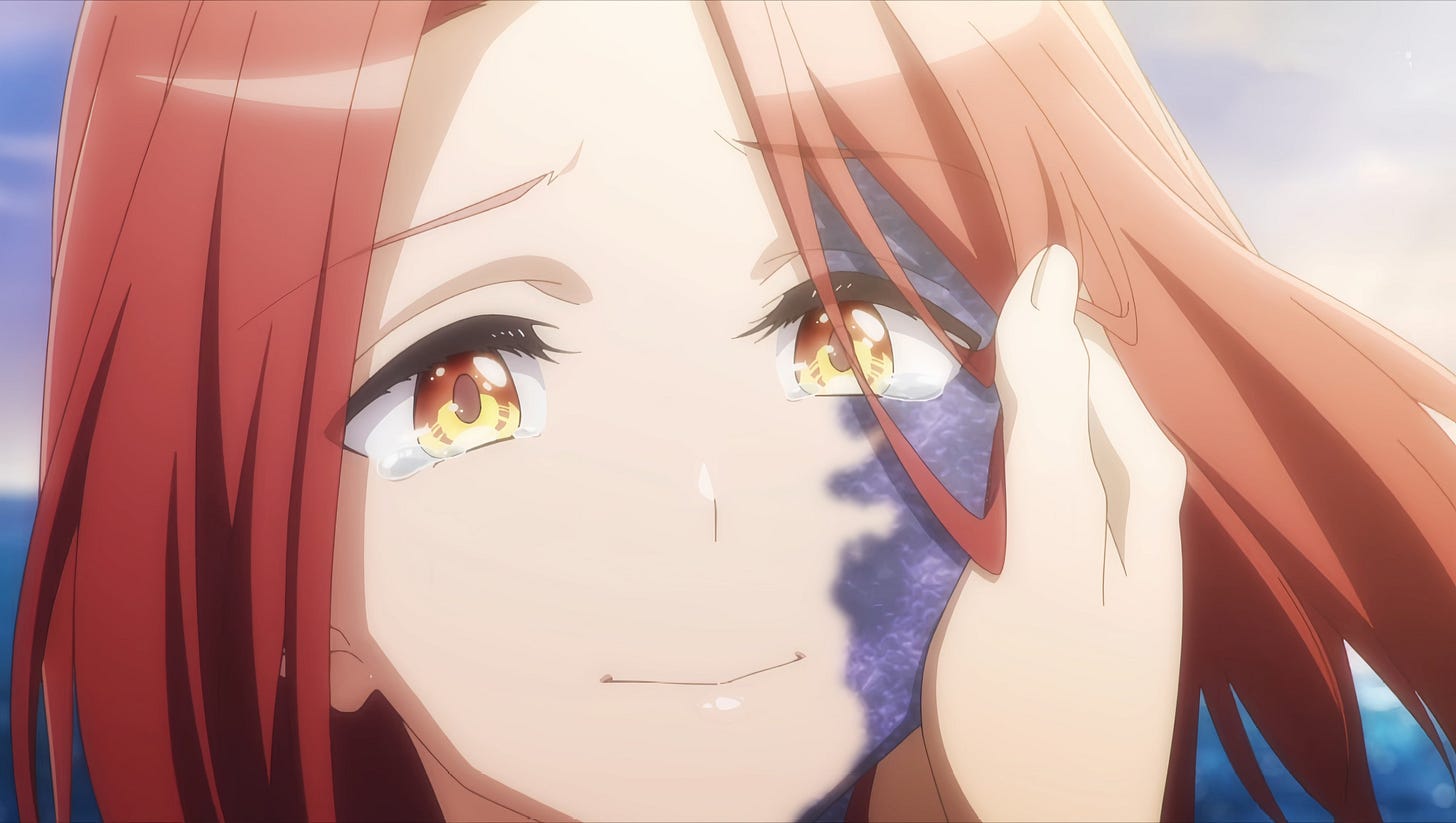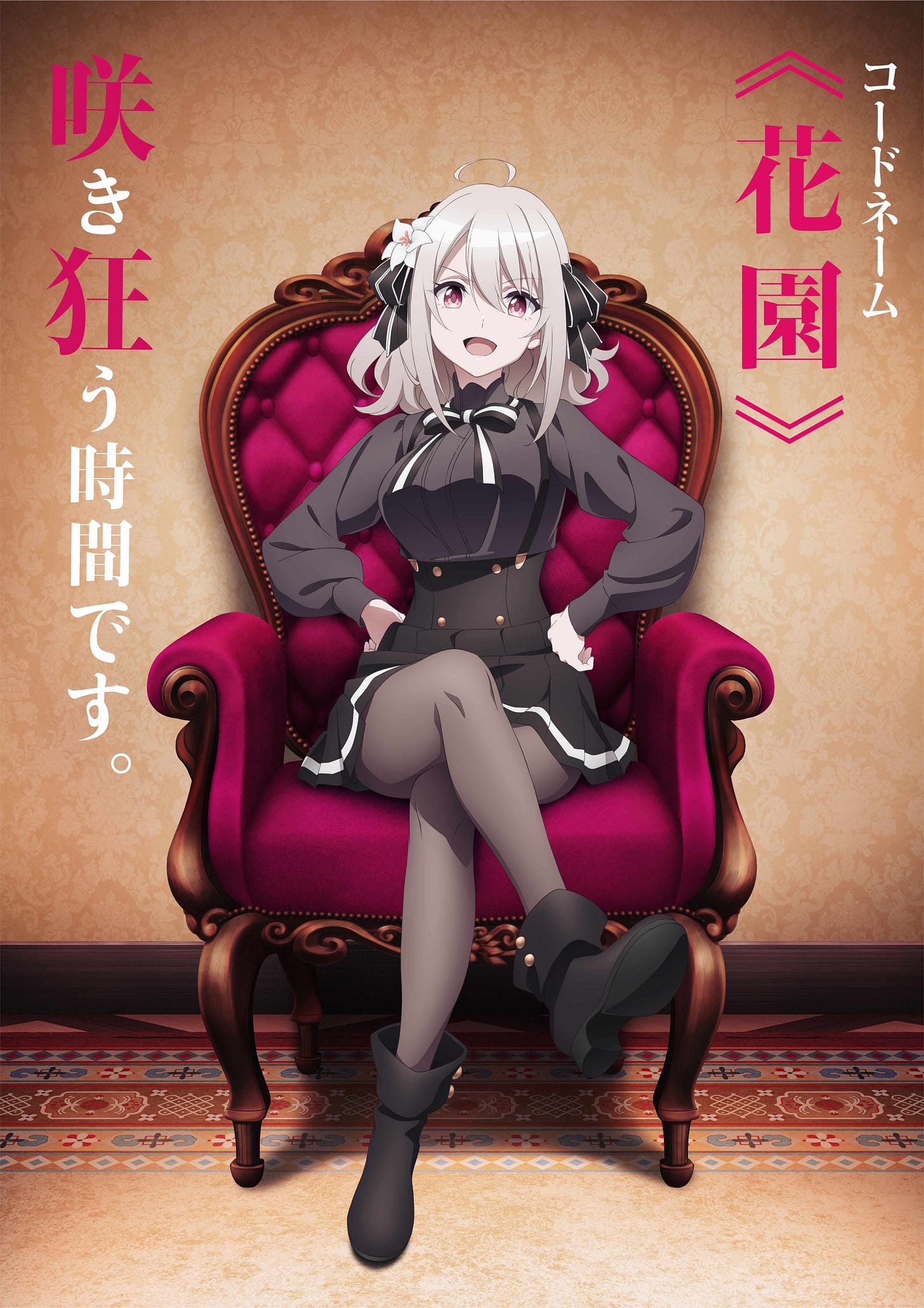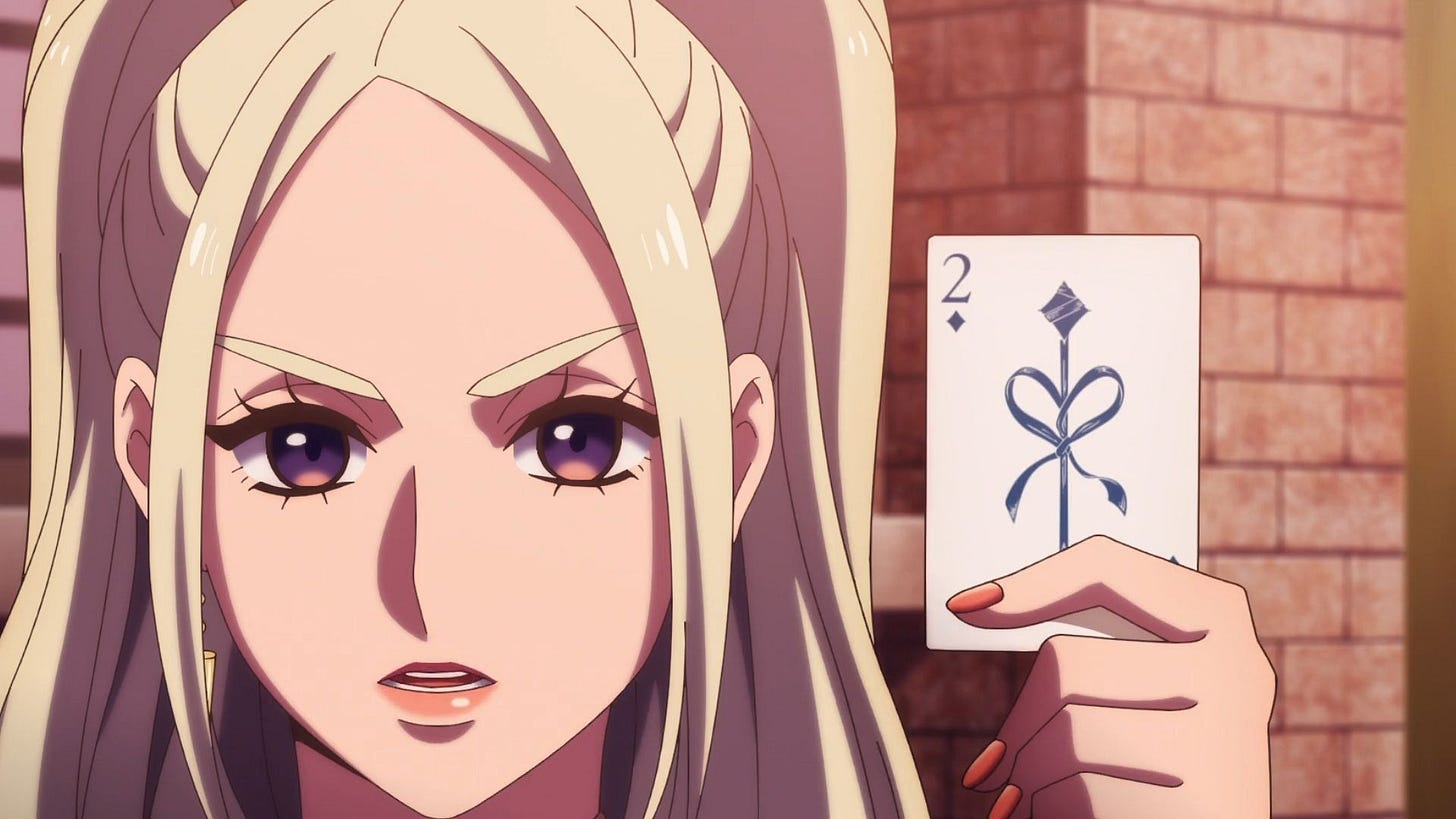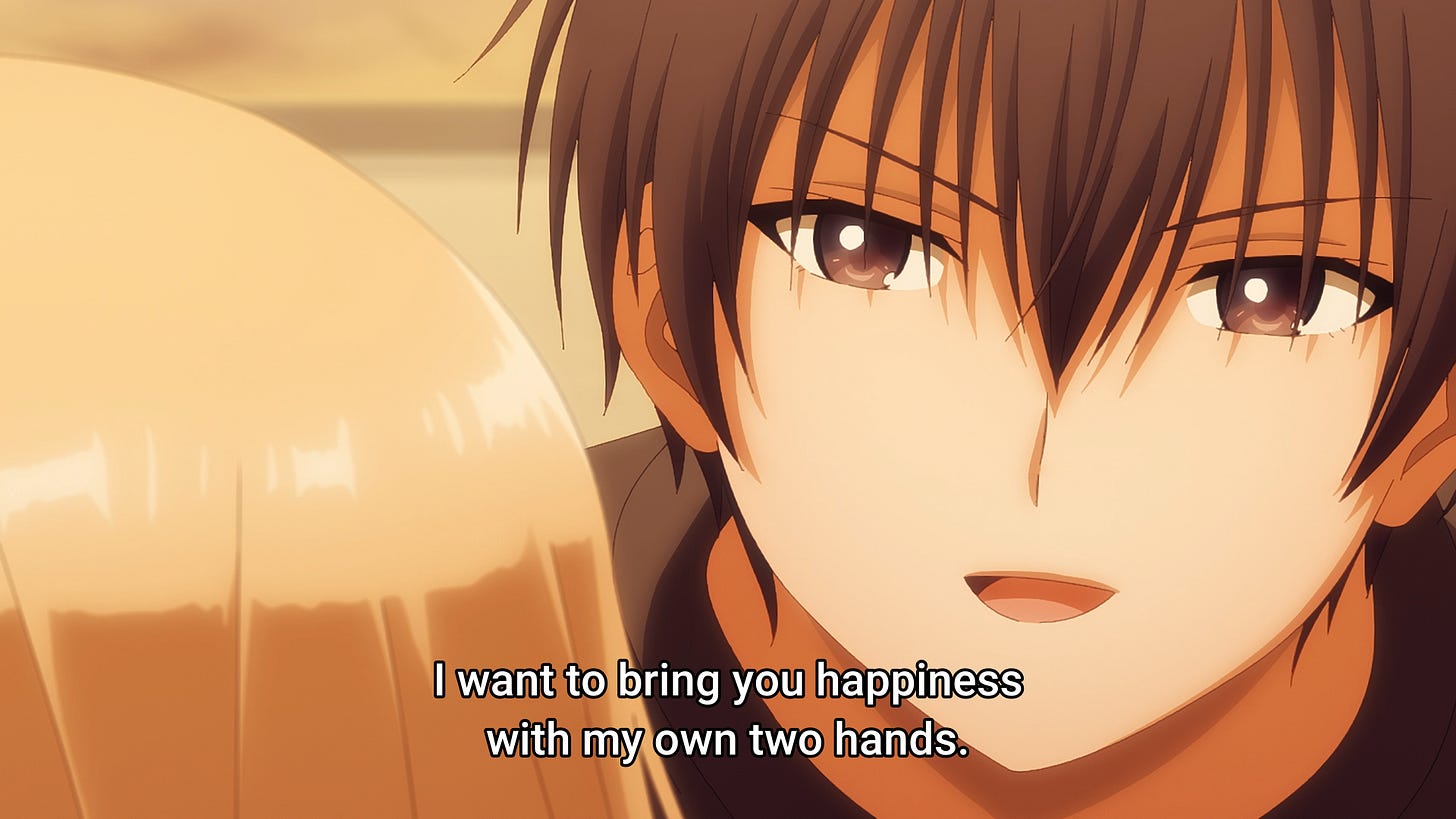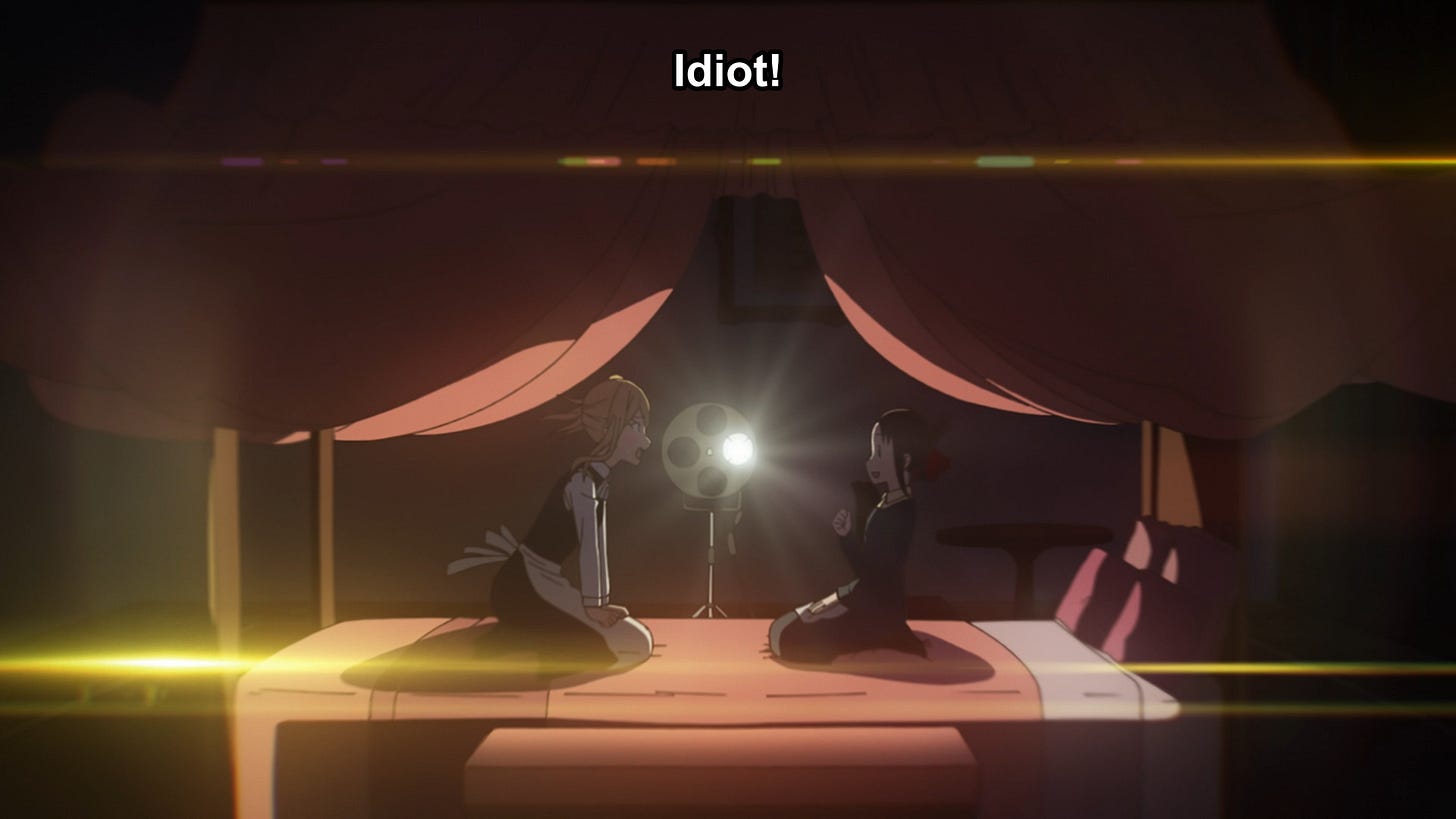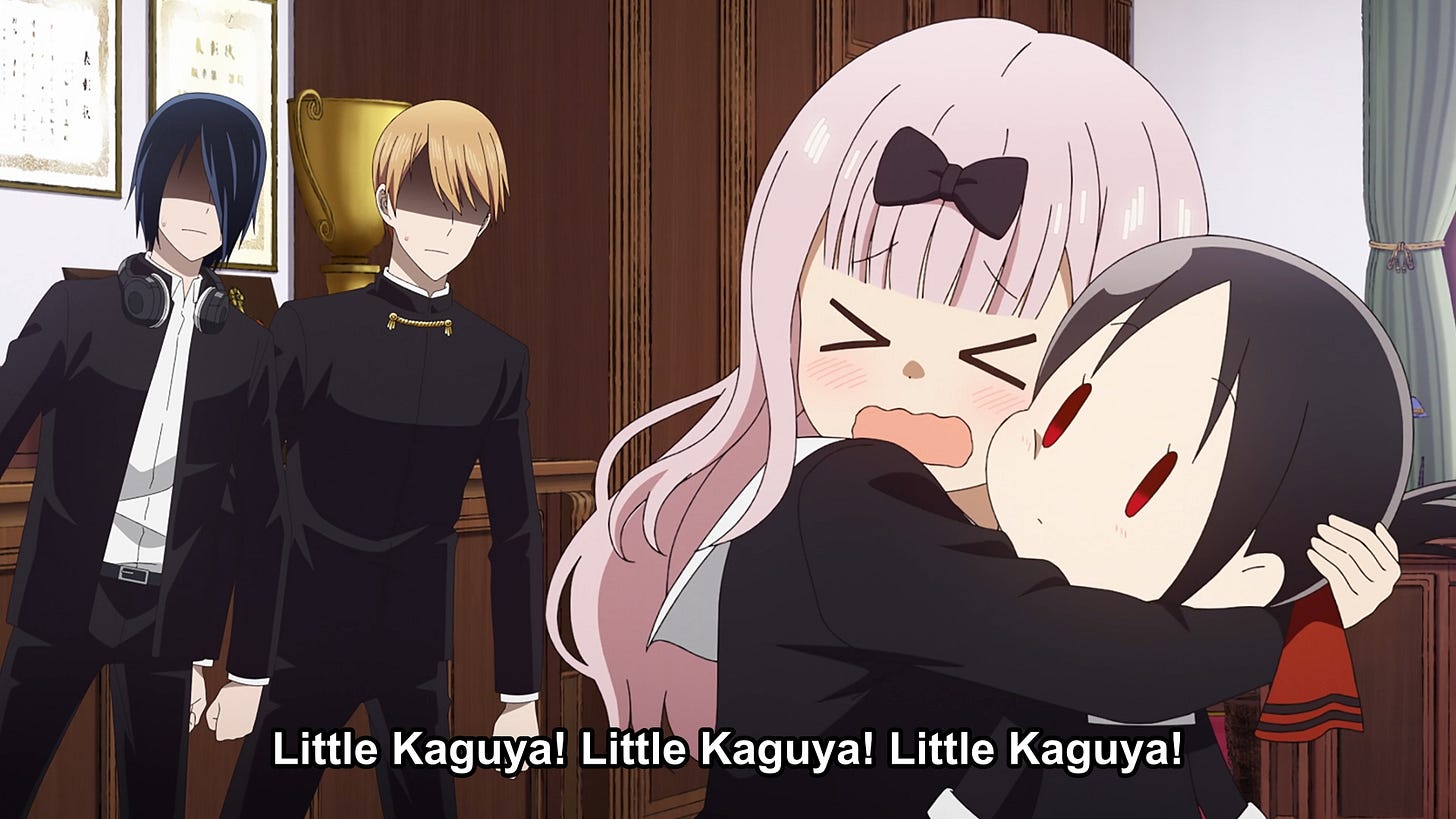While this season wasn’t as tumultuous as spring 2020 during the onset of the pandemic, the delays which impacted several shows this past winter certainly echoed the problems the anime industry faced three years ago. Such shows included Spy Classroom, the second season of Bofuri, Kubo Won’t Let Me Be Invisible, and Ayakashi Triangle (which I ended up putting on hold for a different reason). Assuming there aren’t any more delays, Bofuri’s final episode will air on Wednesday, April 12th Wednesday, April 19th and Kubo Won’t Let Me Be Invisible’s last episode will air on Tuesday, June 20th (technically making it a two-cour anime, ending around the same time as some upcoming spring 2023 titles).
Instead of writing a post/review for every seasonal I complete (and subsequently flooding your inboxes), I thought it’d be more effective to write a “wrap-up” post at the end of each season containing a condensed version of what I thought about each show. This saves me and you some valuable time and effort from having to construct a detailed post to you having to click into each review individually. When it comes to non-seasonals, I’ll think about whether or not I want to include them in wrap-up posts or publish them on their own. Not quite sure yet.
What did I watch?
To kick things off, let me remind everyone of what I watched and finished this season. I’ll admit it was a bit difficult catching up on a weekly basis, and I don’t expect it to be any easier with this spring containing the most titles I’ve ever been interested in watching. But I’m certainly going to try my best! No matter what happens, I still refuse to drop any show I pick up.
If this is your first time here, be warned: there are plot spoilers ahead, so if you haven’t finished watching a show come back to this post later.
The six shows I completed this season are:
The Ice Guy and His Cool Female Colleague (Zero-G, Liber)
Onimai: I’m Now Your Sister! (Studio Bind)
Spy Classroom (feel.)
The Iceblade Sorcerer Shall Rule the World (Cloud Hearts)
High Card (Studio Hibari)
The Angel Next Door Spoils Me Rotten (Project No. 9)
The Ice Guy and His Cool Female Colleague - 7/10 (Good)
Kind-hearted Himuro-kun is unfortunate: when in deep concentration, stressed, or flustered, he involuntarily creates blizzard conditions for himself and anyone in his vicinity. During one such incident on the first day of his new job, Himuro-kun encounters the beautiful Fuyutsuki-san, who helps him break out of his nerve-induced ice. As it turns out, Fuyutsuki-san is his new coworker.
At the office, the cool-headed Fuyutsuki-san offers simple and rational solutions to Himuro-kun's icy dilemmas - everything from helping him garden without freezing his plants to ensuring he does not melt during their tropical work retreat. Every time Fuyutsuki-san does something kind for him, the tempest of emotions he experiences inside embarrassingly manifests on the outside.
As a result of the frequent snowstorms, Himuro-kun's feelings for Fuyutsuki-san are impossible to hide. Even though Fuyutsuki-san is unfamiliar with love, Himuro-kun remains determined to repay her kindness and warm her heart in any way he can.
[Written by MAL Rewrite]
For a rom-com set in a workplace environment featuring a cast of young adults, my expectations were set fairly high; I’ve previously seen Wotakoi and Rikekoi, so I was expecting something similar, if not better than those two shows. The best parts of Wotakoi and Rikekoi were the slowly budding romances that eventually blossomed into something beautiful in the second half (or in Rikekoi’s case the second season). This doesn’t happen in Ice Guy.
The first three episodes start out very promising with Himuro and Fuyutsuki going on a few dates (dinner, amusement park, movie), and you can tell there’s a ton of chemistry between them. So naturally, you’d expect them to get together at some point, right? Sorry to disappoint, but there’s no confession (at least in this season). Past the halfway point, the spotlight shifts to the side couples, whose storylines I wasn’t particularly invested in. As individual characters, I think they’re great, and this includes Komori, Saejima, Katori, and Otonashi. But no matter how much time the show devoted to the side couples, I found myself more invested in Himuro and Fuyutsuki.
Ice Guy does a great job building up the romantic tension and attempts to justify it with eye-catching and intimate scenes (including when Himuro gifts Fuyutsuki a blanket for Christmas and a pair of earrings for her birthday). But what’s devoid of these scenes is a variety of emotions. Sure I smiled when the show wanted me to, but wholesome isn’t enough to carry a show like this. Maybe you can get away with it in a school setting when being in love is more innocent and playful. But these are adults in the workplace. I expect an anime like this to be approached with some level of maturity. Instead, most of the show is Himuro and his internal monologue freaking out about how cute Fuyutsuki is (think Kazuya from Rent-A-Girlfriend, but with a lot more self-respect and the girl he likes is open and actually cares about him).
I also want to mention the finale episode because frankly I didn’t like it at all. It played like any other episode in this season with nothing special about it. Shota Himuro returns when he comes down with a fever, which I guess was fine up until, in a classic anime trope, stumbles over Fuyutsuki and stares at her while she’s pinned onto a bed. Humor definitely wasn’t the intention here (as evidenced by the choice of music), and it was rather uncomfortable to watch this scene play out like it would in any other anime rom-com.
Also, if you decide to insert a recap montage of what happened leading up to the finale, that’s an immediate eyeroll from me. Stop it. You’re wasting screen time.
In spite of Ice Guy’s shortcomings, the anime excels in the visual department. I went into more detail in my winter 2023 overview, but what I said at the start of the season remains true. The colors were vibrant, the character designs were unique, and the attention to detail was impressive (e.g., Fuyutsuki’s earrings and characters’ eye movement patterns). I can confidently say the same about Rikekoi, so kudos to Zero-G for being consistent in their animation and design.
The Ice Guy and His Cool Female Colleague gets 7 mini snowmen out of 10.
If it had maybe one or two more episodes with Yukimin, perhaps I would’ve reconsidered my rating. But for now, it’s a firm 7 from me.
Onimai: I’m Now Your Sister! - 8/10 (Very Good)
Self-professed "home security guard" Mahiro Oyama has not left his home in years, secluding himself in his room playing erotic visual novels. This depraved lifestyle causes his prodigious sister, Mihari, to worry about his well-being. In hopes of solving this problem, she devises a plan to rehabilitate him back to normalcy.
The first part of Mihari's plan is to concoct a medicine that changes her brother's biological constitution into a bona fide female, much to Mahiro's vehement dismay. Stuck in this predicament, Mahiro has no choice but to live out his life as a cute girl until the effect wears off - if it ever does.
[Written by MAL Rewrite]
It’s crazy how this show managed to juggle both degeneracy and wholesomeness without either feeling too out of place. This and the fact that Mahiro actually grows as a person besides being the subject of non-stop gender bender jokes (based on his decision in the end). The words “wholesome ecchi” are rarely placed next to each other in a sentence, but Onimai fits the bill perfectly in its case. Look, I get it. A shut-in adult male suddenly transforms into a pubescent girl thanks to the scientific wunderkind that is his sister. He’s placed in awkward situations and becomes understandably flustered in the presence of multiple teenaged girls, who eventually become his friends. In order to fit in, Mahiro participates in activities traditionally associated with young girls, sometimes to his chagrin but he eventually finds himself having fun. It feels inherently wrong, but context is important here. The reason why Mihari, Mahiro’s younger sister (or older depending on how you look at it), transforms Mahiro into a young girl is because she wants to rehabilitate him - to get him to touch grass and to restore the close bond they once had. In several flashbacks, we see that Mahiro wasn’t always a recluse, and he was actually quite caring for Mihari. But all of that changed once Mihari surpassed Mahiro in terms of academic and life achievements. The transformation allows Mahiro to start anew by repeating middle school and making new friends along the way (something he probably hasn’t done in years). And as Mahiro struggles to navigate womanhood, Mihari is right there to guide him every step of the way, slowly closing the distance between them. These moments of bonding between siblings are one of the many highlights of Onimai.
In addition to Mihari and the role she plays in Mahiro’s character development, I wanna take a moment to address two more characters who I thought contributed a lot as well. The first is Kaede. Other than Kaede having two comically huge Kaedes and being the gyaru type (I swear, Kitagawa Marin awakened something in me), she serves as a secondary older sister figure for Mahiro, often encouraging Mahiro to try new things. What’s more is that Mahiro, in spite of being a girl, doesn’t suddenly become a pervert. He doesn’t lust after Kaede or anyone else in the show, and I’m glad he doesn’t because that would’ve made things weird and would’ve thrown off the tone of the show.
The other character is Momiji, Kaede’s younger sister and Mahiro’s bestie throughout the series. I suppose it’s only natural that he gravitates towards her because of her tomboy personality. It’s easier for Mahiro to feel comfortable around her, and he can act like his normal self instead trying to put up a façade. Both Kaede and Momiji have their funny moments, so I'll tack that on as another reason why I liked them so much. I especially liked Momiji going through her chunnibyou phase in episode 9.
Onimai isn’t for you if you can’t look beyond the basic premise of the story. When you take the time to actually watch a few episodes, you’ll quickly discover that it’s (a) a decent story about a person getting a second chance at life (that isn’t an isekai) and (b) a casual slice of life with some CGDCT sprinkled in. Onimai can be enjoyable; it isn't too serious, but it’s also not just a show of empty calories. Art-wise, this show is beautifully animated, the colors are fitting, and the design changes to most characters are well done; these elements help to make the show a bit more quirky and lively. There’s a fair amount of fanservice involved but not enough to be overly distracting imo.
Onimai gets an 8 out of 10. It’s hard to specify who I’d recommend this to, but if you don’t mind a bit of ecchi or the concept of gender bender, I think you’ll come out of this anime liking it a lot more than you thought you would. There’s also an uncensored version out there, and I’m a firm believer in watching the uncensored version of any anime if it’s available. You won’t get the full experience if you watch a show censored plus what’s the point in watching awkward cut away shots?
Spy Classroom - 7/10 (Good)
A decade ago, mankind witnessed the deadly potential of weapons caused by the Great War. To avoid another catastrophe, governments worldwide have resorted to espionage to fulfill their agendas.
In the Din Republic, Lily is an enthusiastic young girl who aspires to become a spy and serve her nation. However, she begins to doubt her abilities, as she struggles to perform well academically. Lily's passion is reignited when she is offered provisional graduation by joining the spy team Lamplight, which she eagerly accepts despite the enigmatic nature of the opportunity.
Upon arriving at her destination, Lily is surprised to find six other girls waiting there, all of whom have faced their own academic difficulties as well. A mysterious man named Klaus soon appears and reveals they must complete an "Impossible Mission": to infiltrate the Galgad Empire after just one month of training. Although skeptical, the girls eventually agree to work together under Klaus' guidance - as this might be their only chance to prove their worth as spies.
[Written by MAL Rewrite]
If you read my winter 2023 preview post, you’ll know that I was looking forward to watching this anime after a very strong first episode. However, whatever momentum Spy Classroom had was quickly dashed away after three episodes. And unfortunately, it took out a lot of people who swear by the “three episode rule.” Basically, after Klaus reveals he’s assembled this group of misfit girls to take on an “Impossible Mission,” the mission is already underway by the end of episode 2. At this point, the audience knows little to nothing about this team of juvenile spies. The mission is complete by the end of episode 3, and the reason why the story was told this way was to set up the dramatic reveal of an eighth member of the team: Erna, a girl whose specialty is attracting misfortune and disaster wherever she goes. In episode 4, the audience finds out that the mansion that Klaus and Lamplight were living in was bugged with hidden microphones during their training. Knowing this, the team purposefully left out any mention of Erna in order to use her as a secret weapon against the enemy during the Impossible Mission.
While I understand the need to address the twist early, I sympathize with anime-onlies who were thrown off by Spy Classroom’s abhorrent pacing. The Impossible Mission was presented in a way that made it seem like it was the end goal. But with that end goal gone so soon, you alienate your audience and force them to look for a reason to continue watching. With an ensemble cast and a lack of exposition, it’s no wonder why so many viewers were inclined to drop this show so early.
However, it wasn’t all doom and gloom for those like me who decided to weather the storm. Spy Classroom attempts to course correct itself by giving each Lamplight member either a half or full episode dedicated to fleshing out their character. Some are more successful than others, and it sometimes messed with the timeline I had in my head. As for the overarching spy theme, I struggled to take any of it seriously, which seemed to be what Spy Classroom was going for. I think if it committed to being a “cute girls doing spy things” type anime, I would’ve liked it a lot more. But the whole “information war” and espionage thing just didn’t work for me; it fell flat, and I wasn’t invested in it at all.
The last point I want to make before I move on is in regards to Lily. At the start of the show, Klaus selects her to be the leader of Lamplight, and you’d think she’d be the protagonist. However, roughly a third of the season is focused on Grete, who I thought was much more deserving to be the team’s leader. She’s deeply in love with Klaus, but it’s nothing more than an unrequited love as Klaus can’t reciprocate Grete’s feelings. It’s tragic, yet Grete perseveres for better or for worse. But this isn’t why I think she’d be a great leader. Starting in episode 8, when four of the eight Lamplight members are selected to go on a special mission, Grete is the one calling the shots and every move she makes is calculated. Lily, on the other hand, is a bit gullible and ditzy, traits that aren’t necessarily bad but don’t inspire much confidence as someone who’s supposed to be a leader. At the end of episode 11, Grete and Klaus share a great scene together where Klaus calls Grete beautiful in spite of a large purple birthmark which covers a third of her face (she’s constantly wearing a mask to hide it). I was surprisingly emotional during this scene, and it really had me thinking, “Why wasn’t Grete the protagonist from the beginning?” And to top it all off, she’s voiced by Miku Itō, the voice of my favorite quintuplet in anime. Grete was hands down my favorite character from this show.
Visually speaking, there’s nothing to write home about other than each member’s character design. I’m especially a fan of Lily and Thea. Spy Classroom also boasts a catchy OP and five EDs, each with a unique sound and visuals depending on who was the focus of the episode. A second season has also been confirmed for summer 2023, and I think the show convinced me just enough to watch it. I will say that had it not been confirmed, I would’ve been a bit more critical of the finale as it felt like any other episode with nothing special going for it (other than the cliffhanger right before the credits).
Spy Classroom gets a 7 out of 10. There’s definitely room for improvement, and the show has proven it has potential. I’d wait until the end of season 2 before recommending this anime to someone.
The Iceblade Sorcerer Shall Rule the World - 6/10 (Fine)
As the first commoner to attend the prestigious Arnold Academy of Sorcery, Ray White is immediately met with contempt from some of the students hailing from nobility. Unbeknownst to them, Ray's real identity is that of the famous Iceblade Sorcerer - a hero who led the country to victory in a past war and is one of the seven strongest sorcerers alive. Despite his legendary status, Ray wants nothing more than to live out the ordinary school life he never had.
Ray quickly makes friends with some of the most influential students thanks to his kind and amiable nature. Unfortunately, as those with nefarious motives begin to make their move, Ray may soon have no choice but to use his true power to preserve the bonds that make his new life worthwhile.
[Written by MAL Rewrite]
Half-baked. That’s pretty much sums up Iceblade Sorcerer, which need I remind you I picked up on whim because of Amelia’s hair color of all things. From my experience, I tend to rate shows that feature a woman with red hair quite favorably (see Yona of the Dawn and Shirayuki), so I thought, “Why not?” Despite the insurmountable amount of rizz emitting from Ray being able to charm the pants off any girl he speaks to, it isn’t enough to excuse the plot’s lack of substance. The show attempts to educate the audience about how magic works in this universe, but it went over my head completely to the point where I really didn’t care. I just wanted to watch Ray kick ass.
Ray’s rizz isn’t just limited to him as a guy; there’s one episode where he crossdresses to infiltrate another academy and gain more intel on Amelia’s childhood friend and rival Ariane Olgren. In a later episode, he crossdresses to help with his academy’s maid café as part of their culture festival, which I gotta say he pulls off Lily White quite nicely.
Quirkiness aside, I actually liked Ray’s character. Some people might take issue with how OP his abilities are as the iceblade sorcerer, but idk man I think his rizz works through the screen because I certainly didn’t mind. At the start of the show, I thought this was gonna play out like a mid-2010s battle school harem, an anime genre which was popular at the time. But it didn’t, and I think I’m okay with that. After two arcs centered around Amelia and Rebecca, the two promise not to lose to each other when it comes to Ray in the finale episode.
So then why is this anime a 6 out of 10? A couple of reasons. I can’t be bothered to go into detail, so here’s a bulleted list of issues I had with Iceblade Sorcerer.
Art style. There’s nothing unique about it. Kinda bland, cookie cutter, rough around the edges, etc. Granted Cloud Hearts is a relatively new animation studio. Still, I’ve seen better looking shows similar to this.
Too much time was spent on the Magic Chevalier tournament. While I was a fan of Amelia’s training arc, it came at the cost of rushing Rebecca’s arc. Considering Rebecca is always away from the main cast, I wasn’t convinced that her love for Ray was as genuine as Amelia’s.
Elisa and Claris were underdeveloped. They were relegated to being part of Amelia’s cheer squad and didn’t contribute much to the plot.
The same could be said for Evi, Ray’s best guy friend and workout buddy. Completely one-dimensional. I don’t think I learned a single thing about him other than he likes to work out.
Albert’s design change. After he’s defeated by Ray, he suddenly has this epiphany and changes his entire look and personality, which was a huge downgrade imo. I liked him better when he was an asshole, and I didn’t like how he integrated himself into Ray’s circle of friends.
There are plenty of other anime out there that pull off battle school harem with swords and magic much better than this, so if you’re into that I’d recommend Chivalry of a Failed Knight or Asterisk War over this (I still need to watch the second season of Asterisk War). This is the anime equivalent of junk food, so if you’re craving some empty calories this might be what you’re looking for. As far as I know, a second season hasn’t been announced, and even if there was another one, no amount of rizz can convince me to watch more of this series.
High Card - 7/10 (Good)
The royal family of the Kingdom of Fourland holds a secret deck of 52 "X-Playing cards," each of which bestow a superhuman power or ability to whoever uses them. However, the cards were nearly stolen one month ago, and then scattered across the land. In the present, a thief named Finn is struggling to raise funds for his orphanage before the landlord clears it out. After hitching a ride to a casino, Finn soon finds himself inducted into High Card, a special group tasked by the King to recover all 52 cards, while working undercover as salesmen for the Pinochle car company. However, High Card must deal with threats from rival car company "Who's Who" seeking to crush Pinochle, and the Klondike mafia family who wants the X-Playing cards for their own nefarious ends.
[Source: Wikipedia]
For a while, I thought I was gonna rate High Card an 8 out of 10, but after looking at my notes about this anime the criticisms outweighed the praises. I’ll start with the praises since this show started out quite strong and sorta gets lost in the sauce by the midway point. The character designs are fantastic. Everyone has incredible drip, and it isn’t just limited to the main cast working at Pinochle. I’m especially a fan of Wendy and Chelsea’s designs. With the power of her X-Playing card, Wendy is able to unleash the deadly power of Love and Peace, which allows her savage alter ego Love-P to takeover and slice her opponents without mercy. Chelsea, although she possesses a much weaker card that allows her to bond the hands of two people together like super glue, has a much cuter design that has gyaru vibes but not exactly. I didn’t like her at first thinking she’d be a one-off character, but she makes more appearances outside of her debut episode, and I thought she fit into the story quite nicely.
In general, the art and animation for this show was top notch, which I suppose makes sense considering High Card isn’t just an anime original; according to MAL, High Card is a multimedia project that includes a manga and novel series.
The opening and ending songs are absolute bops. So much so that when High Card began, I kept checking Spotify week after week looking for the ending song. I could only find the opening. I wouldn’t be surprised if both of them appeared in my 2023 Spotify Wrapped because they’re both so catchy. Definitely give the full versions a listen.
However, I do have one gripe with the ending song. It’s not so much the song more so it’s juxtaposition with certain episodes of the show. There was maybe one or two episodes where the episode’s ending was very depressing or dark, and then all of a sudden the upbeat energy of the ending song kicks in. It was quite jarring at times, and it made me wonder why the ending song wasn’t left out for dramatic effect.
Moving on to the criticisms I have with High Card, I’ll start with Sugar Peace, the rookie detective working for the police in this anime. She was an annoying tryhard. Just straight up. She doesn’t contribute anything meaningful to the plot, and she’s the laughing stock of pretty much anyone she runs into whether it be her co-workers, High Card, or the Klondike family. And it’s a shame because she’s voiced by Rie Takahashi, one of my favorite voice actresses (Emilia, Megumin). Seriously, if you took out Sugar nothing of value would be lost.
Next up is Vijay. Every member of High Card gets some sort of focus episode, except for Vijay. This led me to believe that he would betray High Card at some point, and his motives and backstory would be revealed then. So when this prediction didn’t come true, I was left a bit disappointed because he seemed like an interesting character given his stoicism and unique ability to control roots and vines. It’s as if the writers forgot that he existed. Given that season 2 is already in production, I hope the writers can redeem themselves by giving Vijay an entire arc dedicated to him.
Speaking of season 2, I think High Card would’ve played out a lot better if it reduced the number of warring elements in the picture. In the first few episodes, High Card goes on several missions to confiscate X-Playing cards from amateur players, who were surprisingly well-written for one-off characters. An entire season dedicated to doing missions like these culminating in Chris using an X-Hand to cure his sister’s illness would’ve done wonders for the pacing. Plus, you could get multiple episodes where each of High Card’s members show off their skills, which is part of another point I’ll get into shortly. Then maybe towards the end of the season, you could tease the arrival of Who’s Who and/or the Klondike family, challenges that High Card will have to face next. High Card suffers from trying to do too much in too little time; in other words, they overcooked themselves just a bit.
Backtracking to what I said about High Card’s skills, the more adversaries and foes introduced, the less confidence I felt in High Card’s ability to collect all 52 X-Playing cards. The Klondike family has several members with abilities that are far more powerful than High Card’s including telekinesis and metallic transmutation. Some of them are barely able to win their fights. And considering each player can only use the power of the card assigned to them, it makes me wonder just how High Card is supposed to achieve their goal. They all seemed capable in their smaller missions, but I don’t think they’re quite ready to take on the Klondikes.
The last criticism I have is in regards to Finn’s phone call to Chris in episode 11, when Finn figures out what Chris is going to do with the 5 of Hearts, Diamonds, Spades, and Clubs. Finn tries to convince Chris to stop what he’s doing by comparing High Card to a second family. However, in spite of his righteousness and the emotion in Finn’s voice, I’m not convinced that the members of High Card are actually tight like that. The show spends a lot of time cultivating the mentor-mentee relationship between Chris and Finn, which I thought was well-executed. But other than that, there’s no reason for me to believe that everyone else has a similar friendship with each other. It seems to me they’re more like co-workers than friends. I didn’t buy any of what Finn tried to sell Chris. From the audience’s perspective, it feels ingenuine, and I think the reason for this goes back to my earlier point about High Card trying to do too much in too little time.
Similar to Spy Classroom, I think High Card did just enough to get me to watch a second season. Hopefully it can iron out some of the wrinkles I pointed out because this series has a ton of potential, especially with 52 X-Playing cards out in the wild. If you’ve watched the Kingsman movies, you might notice how High Card has a similar vibe going for it. Well, that’s because the show’s creators took direct inspiration from the Kingsman franchise and turned it into an anime suitable for Japanese viewers. And to broaden their scope, High Card is set outside of Japan to appeal to a global audience.
High Card gets a 7 out of 10, and I can only imagine it gets better from here.
The Angel Next Door Spoils Me Rotten - 9/10 (Great)
Mahiru Shiina is worthy of her nickname "Angel": she is a divine beauty loved by all, and she excels in both academics and athletics. Shiina lives in an entirely different world from Amane Fujimiya, her next-door neighbor. Despite living so close together, they have never spoken once. But their silence is broken when Fujimiya spots Shiina gloomily sitting on a swing amidst a heavy rainstorm and lends her his umbrella.
When Fujimiya catches a cold the next day, Shiina wishes to return the favor for the umbrella by nursing him back to health. Believing that this would be their first and last interaction, he silently appreciates her kindness. However, Shiina - who can not help but worry about Fujimiya's lack of tidiness and proper nutrition - begins to cook and clean for him. As the unlikely pair spend time together in Fujimiya's apartment, they explore the true nature of their relationship and the gentle emotions that emerge from it.
[Written by MAL Rewrite]
Edging - the anime. That’s it. End of the review.
In all seriousness, this was an anime that was hyped in the pre-season, which led to more scrutiny on my part. I can confidently report that Angel Next Door lived up to said hype, and for great reasons. To use more professional wording rather than “edging,” this anime is really good at building romantic tension. And it never gets sexual, which makes sense because Mahiro and Amane start the series as complete strangers and are unsure about the other’s feelings throughout. The bulk of the show explores the indecisiveness of both characters as they struggle to act on their feelings. After all, they never thought they’d find themselves in such a position much less fall in love. And while it might be a slow burn for some, it’s quite the opposite as the finale provides a satisfactory pay off worth waiting for. To put it quite bluntly, the final episode is equivalent to the sweet feeling of sexual release.
I also wanna give a shoutout to Amane’s friends Istuki and Chitose, who are a couple with a much more affectionate relationship than Amane and Mahiro. But it’s not like their screen time is entirely them being all lovey-dovey. In fact, they occasionally tease Amane and Mahiro about their feelings for each other in small attempts to get them together. I like this because it’s not like they’re being too pushy; they’re aware that it’s ultimately up to Amane and Mahiro to sort out how they feel. Itsuki and Chitose are simply giving them a gentle push as a way to show their support.
Chitose is a real one for what she did at the sports festival, which turned out to be a major turning point in the finale episode.
One minor gripe I thought would be worth mentioning is the series’ opening song. The bubbly, upbeat sound of the OP doesn’t really match the vibe of series, which feels much more calm and grounded. For that reason, I usually skipped it, but you can listen to it here and judge for yourself.
Dissidents will say this is just a generic wish-fulfillment series, but like, who doesn't want a relationship built on trust and honesty that has people encourage and support each other to be better? We stan communication! We love it when romantic interests talk things through! Amane and Mahiro are actually the masters of unspoken rizz, and I couldn’t get enough of it. Definitely give this one a shot if you’re into romance anime or looking for something comfy and warm. We still have a long way to go, but Angel Next Door is definitely up there on my list of favorite anime from this year. No word yet on a second season, but even if there isn’t one I’m pretty happy with what we got in 12 episodes.
The Angel Next Door Spoils Me Rotten gets a 9 out of 10.
Bonus: Kaguya-sama: Love is War - The First Kiss That Never Ends - 10/10 (Masterpiece)
After their first kiss, Kaguya Shinomiya and Miyuki Shirogane are left unsure where their relationship stands. The troubling uncertainty of whether they could be considered an official couple unleashes newfound problems as both Kaguya and Shirogane struggle to sort out their feelings.
While the lovestruck student council officers fret, the Christmas season rolls around, and romance is in the air. In the face of widespread tenderness, Kaguya and Shirogane must endure their affectionate battle of wits once more. Should they reconcile their feelings for one another, they may find themselves within reach of what they have both been longing for so long: true love.
[Written by MAL Rewrite]
Originally, I wasn’t going to include this one in my post, but the subs came out around the time that I’m writing this, so why not? For those who aren’t following this series, the Love is War movie was split into four episodes for television/online release (it was released in theaters in Japan in December 2022 and in the US in February 2023). In the latest season finale, Kaguya and Shirogane shared their first kiss together after three seasons of psychological warfare aimed to get the other to confess their feelings first. Now, this movie deals with the aftermath and how the two will approach this change in their relationship.
I wasn’t expecting this movie to get as deep as it did. Like I expected the comedy, but the movie asked some serious questions. What masks do we wear in front of others? How much of our need to better ourselves ends up being a way to mask insecurities? Throughout the series, Kaguya and Shirogane's competitive nature was largely played for laughs, but there was always an undercurrent that they acted like this because they were flawed individuals. Kaguya knew she was a terrible person and someone so vile that even she couldn’t love herself. How could Shirogane love someone like her? Kaguya’s upbringing forced her to form a distorted personality to protect herself (i.e, Ice Princess Kaguya). Shirogane was deeply traumatized by his mom leaving him at a young age because he wasn’t good enough. His view of love was transactional, and others would only love him if he proved his value. That’s why he had to work so hard to put up a façade, hoping someone would love him.
For me, the movie was reminiscent of the last few episodes of the Oregairu series, right before Hachiman and Yukino have their moment on the bridge. That along with the scene where Kaguya and Shirogane were in the park were full of raw emotion that tugged a bit at my heart strings.
But Love is War wouldn’t be a rom-com if it didn’t uphold the comedy part, so here are a couple of screenshots I took that I thought were funny.
And it goes without saying that the OP and ED for this arc were bops.
Love is War manages to take an ending that many people would’ve seen as perfect and retroactively makes it seem hollow and incomplete in hindsight. Heck, I would’ve been alright if it ended right then and there. But as satisfying as the moment was, it was still part of the "War" between Kaguya and Shirogane. And you can't really have a satisfying conclusion for this story until they both realize the whole concept of "Love is War" is bullshit. And despite that incredible display and the kiss at the end of last season, both of them are nowhere near being able to drop the shenanigans and just be honest with each other. Kaguya has split personalities, and Miyuki's is obsessed with appearing perfect to the point that his room looks like it belongs to Joe Goldberg. They needed this moment for their relationship to actually make sense.
The Love is War movie is a 10 out of 10.
What’s next?
And with that, that brings us to the end of my reviews for winter 2023! As of April 10, Bofuri still has two more episodes left in its second season and Kubo doesn’t start back up until mid-May. Expect those reviews to be part of my spring 2023 wrap-up, which will be a lot longer than this one. In the meantime, I have - checks calendar - 13 first episodes I need to watch and include as part of my spring 2023 preview! And don’t even get me started on non-seasonals. I’ve left the final season of Fruits Basket on the backburner for months now, and I’m only one episode into the first season of Teasing Master Takagi-san.
Make sure to follow me on MAL and AniList for regular updates. You can also bookmark my public spreadsheet for more in-depth data and statistics.
If you’ve come this far, thank you for reading! If you’re interested in more reviews like this, consider subscribing to Anime Everywhere All at Once! It’s free! You’ll receive an email every time I post a new review or seasonal overview.

